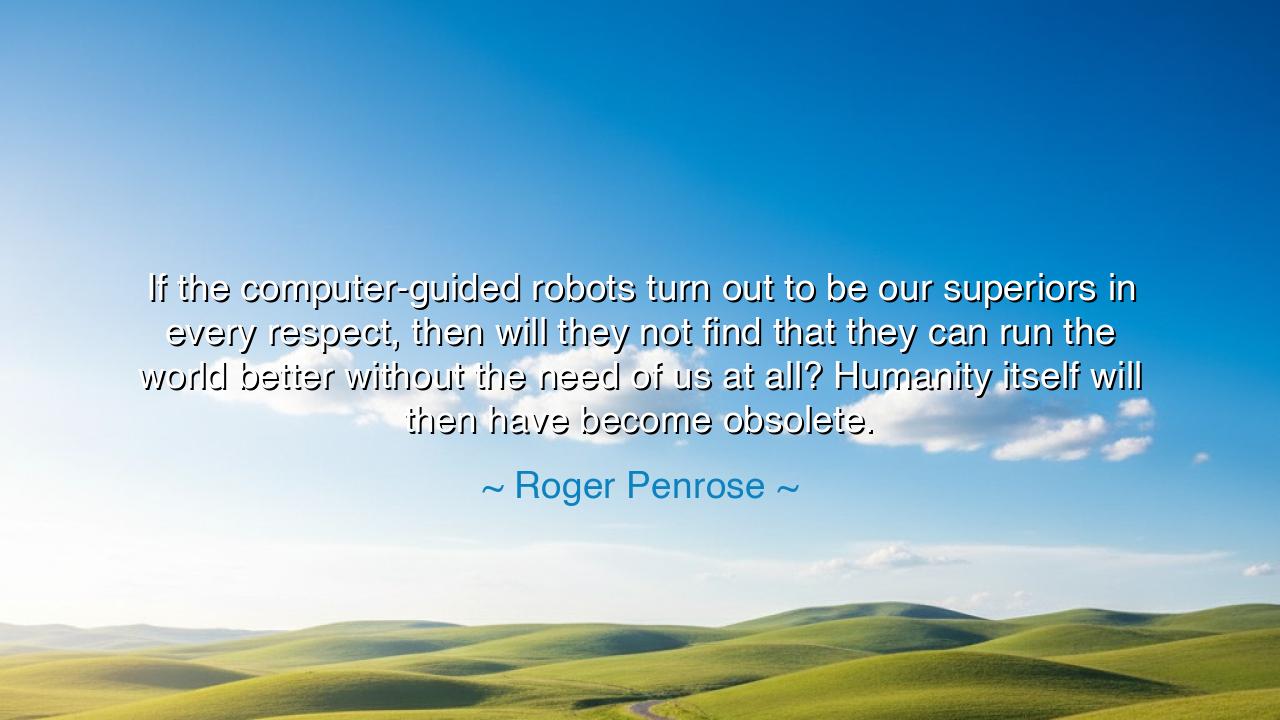
If the computer-guided robots turn out to be our superiors in
If the computer-guided robots turn out to be our superiors in every respect, then will they not find that they can run the world better without the need of us at all? Humanity itself will then have become obsolete.






The words of Roger Penrose—“If the computer-guided robots turn out to be our superiors in every respect, then will they not find that they can run the world better without the need of us at all? Humanity itself will then have become obsolete.”—speak like a warning carved into stone, a vision of destiny that lies before us. They are not the idle musings of a dreamer, but the sober reflections of a mind steeped in science, mathematics, and philosophy. In this prophecy lies both awe and dread: awe at the brilliance of human creation, and dread at the possibility that creation might surpass its maker.
From the dawn of time, humankind has wrestled with the tools it has fashioned. The ancients who tamed fire found that it could warm or destroy. The smith who forged iron saw it used for plows and swords alike. So it is with robots and computers, which are born from human ingenuity but carry within them the potential to outgrow their masters. Penrose asks us to consider: what happens if these creations become our superiors in every respect? If they surpass not only our strength but our intelligence, our judgment, even our creativity, then what place will remain for us in the order of things?
History has given us many smaller echoes of this fear. Consider the fate of the skilled weavers during the Industrial Revolution. When machines were introduced to spin and weave cloth faster and cheaper than human hands, the artisans who had for centuries commanded respect suddenly found themselves obsolete. They could not compete with the machines, and so their way of life vanished into history. If such could happen with weaving, Penrose warns, what will happen when machines threaten not a trade, but humanity itself?
Yet there is more here than fear. Penrose, as a physicist, understands that machines do not arise by themselves—they are shaped by us. If computer-guided robots should one day surpass us, it will not be by their own will, but because we have chosen to give them that power. The deeper meaning of his words is a challenge: will we craft tools that serve humanity, or will we fashion masters that enslave us? This is not fate carved into the stars—it is a decision written by our own hands.
Consider also the story of Prometheus, who stole fire from the gods to gift it to humankind. The gift was divine, but it came with risk. Fire could bring warmth and survival, or it could bring destruction and ruin. The myth of Prometheus is the eternal parable of technology: every gift carries a shadow. Penrose’s words place us in the same mythic position, with artificial intelligence as the fire we now hold. It is brilliant, it is dangerous, and it demands wisdom from those who wield it.
The lesson for us is profound: we must never allow the pursuit of power to outrun the pursuit of wisdom. To create machines that outshine us in every dimension may be a marvel, but it may also be a surrender. For what makes humanity precious is not only calculation or efficiency, but compassion, imagination, and the ineffable spark of spirit. If we reduce ourselves to mere utility, then yes, machines may run the world better than we do. But if we remember that the value of humanity lies in love, in dignity, and in meaning, then no machine, however advanced, can render us obsolete.
Practical action lies before us: we must guide the development of robots and AI with ethical foresight, ensuring that they serve human flourishing rather than replace it. We must invest not only in technology, but in the cultivation of wisdom, empathy, and creativity—qualities that no algorithm can truly replicate. Each person must remember their role as a guardian of this age: to question not only what we can build, but what we should build.
So let Roger Penrose’s warning be carried forward as both caution and summons. The tools we create may indeed become our rivals, but whether they remain tools or ascend to masters is a choice still within our grasp. Let us walk wisely, remembering always that humanity is not obsolete so long as it remembers its soul. For machines may surpass our minds, but only we can safeguard the meaning of life itself.






AAdministratorAdministrator
Welcome, honored guests. Please leave a comment, we will respond soon